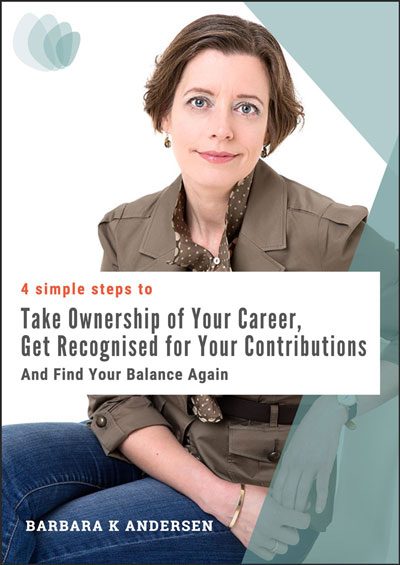Happy UN Career Podcast / Episode 12
Do You Need Others to Approve of Your Career?
Episode 12 / 16 December 2020
SHOW NOTES
Welcome to this 12th episode of the Happy UN Career Podcast!
I’m so pleased to see that the podcast has been well received by you who are listening. Because without you – there really wouldn’t be much point in doing this. 🙂
It’s very interesting to see the metrics for the different episodes and I can see already that some episodes are particularly popular. One of them is episode 10, the one I called “Take a Chance” where I interviewed my former colleague from UNDP, Mike Dodd, about how he’d taken chances in his career.
So, if you haven’t heard that one yet, I’d encourage you to go back and give it a listen at www.barbarakandersen.com/10.
Your UN Career Belongs to You
Inspired by my talk with Mike, I wanted to talk a bit more in today’s episode about how important it is to acknowledge that your career really and truly is a personal and individual thing. Your career belongs to you!
And here you might say: “Well, isn’t that obvious? We’re all individuals with distinct personalities, and competencies and skills. How can a career not be personal and individual?”
However, so often when I talk to people (and this goes for both clients, friends and old colleagues) it strikes me that we constantly compare ourselves to others and how they’re doing. What they’re doing.
Especially those that are ahead of us in terms of being at a higher level in the hierarchy or are working in areas that are somehow deemed more important or influential.
It’s easy to get a feeling that you should be more like those people, find out what they do and maybe try to do the same thing. Progress in the same way as them. And that feeds the sense that so many of us are struggling with already.
That we’re not quite measuring up.
That we’re not making the choices we ought to make. Or succeeding in the way others expect of us.
So, I have a question for you today:
Do you feel that your career has to live up to other people’s expectations?
What I have noticed is that we attach quite a bit of value to what other people think of us, and our career. How they evaluate how we’re doing in our career. What we’re doing. Or who we report to. Or what our title is. And so on.
I wonder if you recognize this?
We’re influenced by societal norms. But maybe even more by organizational norms. That make us look at what others do. Thinking, maybe that’s what I should do?
But we’re also influenced by others’ opinions and expectations of us in a very direct way. We’re influenced by what our parents taught us, by what our spouse or partner wants for us, by what our supervisor expects, what our friends suggest, and so on.
This goes from: what next job you should pursue to how to do networking or promote your work – or yourself!
And all these expectations and suggestions come from a good place. All these people care for you and want what they think is best for you. For you to fit in. Be successful. And be safe. Based on their own experiences and how they see the world.
But what works for one person does not necessarily work for the other.
And yet, I find that a lot of advice around career is not particularly centred on supporting that sense of the individuality. Or finding out what inspires and motivates you in your work life.
These days, most UN organizations try to place more emphasis on professional development through lateral moves, because there are simply not enough free steps on the career ladder for all of those who want to climb that ladder. But you’re still getting a subtle message from most people around you that climbing the career ladder, moving up through the ranks, is the real, the recognized way to have a career.
I’ve spoken to people who said that they knew they ought to try to move from the field to an HQ duty station in order to promote their career, but they also knew that they preferred work – and life – in the field. And good for them that they had this awareness for themselves!
And I’ve met several people who were torn between the pressure to climb the career ladder to positions with more strategic and administrative responsibility (and, of course, a higher salary) – but where they felt that they would also be more removed from the technical aspects of their field that they actually felt more motivated by.
Career tracks can be beneficial. Getting advice on what kind of work experience and training might be helpful if you want to progress in a specific field can certainly be very useful. But it can also create the notion that this is the way we should move forward. This is what you ought to do in order to be successful!
And we love to get advice. We crave advice! From Human Resources, from management, from our supervisor.
Tell me: what should I do? What do you think would be the best move for me? How will I best develop professionally? How can I position myself for moving to the next job, the next level?
Because we so want to get it right.
Just be aware that this is somebody else’s advice. It may not necessarily be right for you. Or at this time of your life.
And you can get afraid of deviating from the track. Do you dare take a chance by deviating from the path and following a dream? Like Mike did – as he shared with us in episode 10.
Sometimes people tell me that they actually feel a certain disappointment. Because they followed all the advice. They walked the path that was prescribed.
But they’re not really happy where they are. Or with what they’re doing. Or they feel they lost some of the balance in their personal life on the way. And now they’re feeling strangely guilty. They’re supposed to feel happy and satisfied, so why aren’t they?
So, are there things you do – or don’t do – because you feel you should be following a particular path?
Do you worry about what other people think? Your boss, your colleagues, your partner, your parents? I meet many people, with families and children of their own, that are still very much driven by a desire not to disappoint their parents.
Just know that what another person says about you and your career will always be based on how they see the world.
Sometimes they know you well and give you just the right piece of advice, just the right question to consider. But at other times their input is not based on a good understanding of who you are today, what your reality looks like – but is just a reflection of their own fears and concerns in life.
And the only way to really feel ok in your own way of doing things is to truly acknowledge and understand what drives you. And be sure that you’re making your choices based on your own values.
A Strong Foundation Builds Confidence in Your Choices
You could call it your foundation. Or your roots in life. It’s essentially an understanding of what it’s important for you to have – and to contribute, in your career and work life.
When you have that solid foundation, those strong roots, you’ll feel much more confident with your choices of what to do – and what not to do.
Creating that strong foundation is always a key element when I work with my clients, and I’d like to share two interesting tools you can work with on your own:
The 1st tool is the Career Journey exercise that I shared with you in Episode 4: the one called “How Was Your Career Journey?” Some of the questions you can ponder in that exercise are e.g.:
- At which times in your career have you been the happiest coming to work in the morning?
- When have you felt most content with – or excited about your job tasks?
- What kind of teams have you felt most energized by – or most supported by?
And there are many more, that you’ll find in the show notes for episode 4.
The 2nd tool is the one I shared with you in Episode 3. The one called “What Drives You and What Drains You?”.
Here you discover what daily work tasks and actions motivate – or drain you. You can go back and listen to that episode on www.barbarakandersen.com/3. There you’ll also find show notes with the details of the exercise.
Find Your Own UN Career Path
I urge you to go on and find – and trust – your own work and career path. One that you will feel happy and confident with!
Maybe you need to make experiments? Test things out. In small or big ways. It doesn’t have to mean venturing out to get a new job if you’re not ready for that yet.
Do you want to find out what’s a good work-life and career for you? How you develop in a way that’s interesting and motivating for you?
Then think about:
- What tasks do you enjoy?
- What responsibilities make you feel engaged and motivated?
- What kind of people do you enjoy working with? Is it for example:
- Those that make you laugh?
- Those that make you see new perspectives? Or
- Those that you share a common technical background with where you can be nerdy about your specialisation?
- Do you thrive with a lot of teamwork?
- Or do you prefer a lot of time where you can work concentrated on your own?
Or maybe just ask yourself this one question:
- What kind of workday makes you go home feeling happy and satisfied with your work and yourself?
Find Support – You Don’t Have to do it on Your Own
Feeling dissatisfied or unsettled in your professional life is a big stressor in the long run. And it’ll deplete your resources at so many levels. Do everything you can to move away from that situation.
And you know what I’m going to say! Find somebody you can talk to about this.
It’s great to think about these questions on a walk or in the car, but it makes a big difference to speak with another person that you trust. Maybe your partner would be a good choice? Or a good colleague or friend who knows you well?
What’s Next?
In the next episode, I’ll talk about how to use the end of the year to take stock and celebrate everything you did and all that you accomplished in 2020.
This has been a truly challenging year for everyone, and I hear people talking about just throwing the whole year in the trash bin and forgetting about it. But that would be a big shame, I think.
I’m certain that you accomplished much more in 2020 than you’re even aware. And you should celebrate and learn from that if you ask me!




